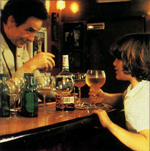A dashing, successful writer of lurid romance novels named Robert Harmon (John Cassavetes) arrives home in the middle of the day – still stylishly dressed in formal evening attire – to find an odd assortment of vivacious, attractive young women engaged in frivolous activities as they bide time awaiting his return. Attempting to engage one of his flighty companions into a seemingly more meaningful interview (that he is presumably audio tape recording as research for his work), Robert asks her what her definition of a “good time” is – a question that the disinterested young woman is eager to cut short with prolonged silence and curt responses. Robert purports to know the answer, and attempts to steer the conversation by commenting that the underlying key is in “being with someone”. However, as he scuttles his ever constant parade of compensated escorts out of the house in a series of confused and anonymous transactions of personal checks and hired taxicabs (ironically exchanging empty kisses and declaring “I love you” to no one in particular), his vacuous lifestyle betrays his own incapacity for real intimacy – his sad disconnection from the emotional complexities of love that exist between the void of his casual affairs and investment in a deeper, more meaningful relationship.
Meanwhile, in another town, Sarah Lawson (Gena Rowlands) enters an empty conference room with her adolescent daughter Debbie (Risa Blewitt) and immediately begins to lavish the girl with presents, her myopic doting only briefly interrupted by the entrance of other people into the room, including her estranged husband Jack (Seymour Cassel). Sarah and Jack have assembled for a meeting with their legal counsel and the presiding judge (Joan Foley) in order to finalize the terms of an increasingly acrimonious divorce. However, despite a mutually pre-arranged custodial agreement, Sarah interrupts the legal proceeding by inopportunely stating her intention to take their daughter out of the state for an indeterminate period of time, traveling cross-country in order to visit members of Jack’s family who are suffering from ill health, and justifies her unusual intention by commenting, “You might say that’s what I do. I visit sick people”. Seeking guidance from a psychiatrist after suffering a hysterical collapse in front of the judge, she is advised to distance herself from her family by traveling abroad and embarking on a meaningless love affair. Unable to cope in an environment of complete strangers, she decides to return home and pay a visit to Robert, and invariably finds a new focus for her desperate affection in her equally emotionally crippled brother.
Based on a play by Ted Allan, Love Streams is a haunting, provocative, and brutally honest examination of love, emotional need, loneliness, and longing. In contrast to the active and confrontational camerawork of his earlier films (most notably in Faces), John Cassavetes creates a spare, muted, and objective portrait, capturing with underlying compassion the empty lives of emotionally adrift characters who act out the ache of their unarticulated despair through incomprehensible, cruel, and often self-destructive acts. Cassavetes further incorporates recurring episodes of representational surrogacy in order to reflect the film’s theme of emotional substitution: Robert’s instinctive and automatic disbursement of personal checks to his companions and ex-wife; his night club encounter with an admiring female impersonator named Phyllis (Logan Carter) who is drawn to the portrayal of loneliness in his novels; his estranged young son Albie’s (Jakob Shaw) difficult and conflicted relationship with his stepfather (Eddy Donno); Sarah’s pattern of smothering and overcompensating attention towards her resentful family; her unconsulted decision to find a baby for her brother that results in a bizarre, compulsive purchase of a farm menagerie. Inevitably, as Sarah attempts to rationalize her tenacious attachment to her unfaithful husband and troubled marriage through her fragmented explanation, “Love is a stream. It’s continuous. It doesn’t stop”, she metaphorically encapsulates the profound and indefinable – and often elusive – eternal human search for connection, love, acceptance, and intimacy.
© Acquarello 2003. All rights reserved.
